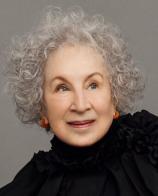Reading Group Guide
Discussion Questions
Bodily Harm

1. Rennie has a series of dreams in which her grandmother complains that her hands are missing. Rennie, a writer, interprets this as dream-evidence that her grandmother is dead. What does a loss of one's hands represent? What does it mean for a writer in particular?
2. Atwood writes, "The number of things Rennie thinks ought to happen to her in foreign countries is limited, but the number of things she fears may happen is much larger." For Rennie, which type of experience proves to be more transformative?
3. "Other people make statements, I just write them down," claims Rennie. Consider the difference between observing and reporting actions as opposed to engaging in them. By observing, does one become a de facto participant?
4. In St. Antoine, Rennie is an "other" fivefold: she is single, a woman, a reporter, a white, and a Canadian. Yet each of her distinct identities frequently clash with one another. As a white Canadian, she allied with a strong majority; as a single woman, she represents a vulnerable minority. At times, however, her status as both a Canadian and a woman earns her the epithets "sweet" and naive". How do the many layers of her outsiderdom intersect? How do they reinforce or invalidate each other?
5. After her relationship with Jake, Rennie finds herself infatuated with two men--Daniel and Paul--each of whom offers her an incomplete sort of relationship. What does each have to offer her? How do they complement each other?
6. The specter of the man who broke into her apartment and left a length of rope behind follows Rennie on her travels. Who is this man? What does he represent?"
7. Compare Jocasta and Lora. What insights does each offer into the nature of women's' friendships? The alliances that women form? The kinds of choices women make throughout their lives?
8. After Minnow's assassination, Rennie realizes that he asked her to write about St. Antoine "so there would be less chance of this happening to him." What control do words--via the media and the press, have over the course of unfolding events?
9. Consider Jocasta's and Rennie's assessments of men's and women's relationships and the new crises and anxieties that sexual equality poses. Do you agree with their perception of the situation? How, if at all, has sexual politics changed in the sixteen years since this novel was written?
10. While imprisoned, Rennie discovers that after listening to distant screams long enough, her ear tricks her brain into thinking she's hearing a party. What other means does her brain and body have of enabling her to survive her imprisonment? How does the human body cope with assaults imposed from within (cancer, disease, loneliness) as opposed to those from outside from outside (torture, prison)? Does she have more control over one than the other?
11. On the plane ride home, Rennie notes a significant change. She realizes, however, that what has changed are not the ice cubes, the people, and the world around her, but the way she notices them. How have her experiences changed her? What events in your life cause you to view everyday sights and events differently?
Bodily Harm
- Publication Date: April 13, 1998
- Paperback: 291 pages
- Publisher: Anchor
- ISBN-10: 0385491077
- ISBN-13: 9780385491075







